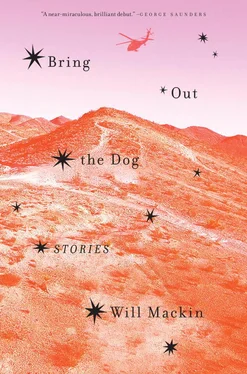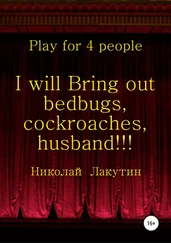Will Mackin - Bring Out the Dog
Здесь есть возможность читать онлайн «Will Mackin - Bring Out the Dog» весь текст электронной книги совершенно бесплатно (целиком полную версию без сокращений). В некоторых случаях можно слушать аудио, скачать через торрент в формате fb2 и присутствует краткое содержание. Город: New York, Год выпуска: 2018, ISBN: 2018, Издательство: Random House Publishing Group, Жанр: prose_military, на английском языке. Описание произведения, (предисловие) а так же отзывы посетителей доступны на портале библиотеки ЛибКат.
- Название:Bring Out the Dog
- Автор:
- Издательство:Random House Publishing Group
- Жанр:
- Год:2018
- Город:New York
- ISBN:978-0-812-99564-0
- Рейтинг книги:5 / 5. Голосов: 1
-
Избранное:Добавить в избранное
- Отзывы:
-
Ваша оценка:
- 100
- 1
- 2
- 3
- 4
- 5
Bring Out the Dog: краткое содержание, описание и аннотация
Предлагаем к чтению аннотацию, описание, краткое содержание или предисловие (зависит от того, что написал сам автор книги «Bring Out the Dog»). Если вы не нашли необходимую информацию о книге — напишите в комментариях, мы постараемся отыскать её.
Bring Out the Dog — читать онлайн бесплатно полную книгу (весь текст) целиком
Ниже представлен текст книги, разбитый по страницам. Система сохранения места последней прочитанной страницы, позволяет с удобством читать онлайн бесплатно книгу «Bring Out the Dog», без необходимости каждый раз заново искать на чём Вы остановились. Поставьте закладку, и сможете в любой момент перейти на страницу, на которой закончили чтение.
Интервал:
Закладка:
Hal, with his scar like a frown even when he was smiling, nodded my way. I nodded back.
“We can work that out,” Hal said.
LEVI BECAME OUR howitzer liaison. He moved into our compound and had his mail delivered to our tactical operations center. Every now and then, packages would arrive from his mother in Amsterdam. Inside the packages was a variety of Dutch candy.
Levi opened these packages at his desk. He removed the ouwels and the stroopwafels and kept them for himself, but he always left the Kattekoppen in the box. Apparently, Levi had loved these candies as a kid, and his mother was under the impression that he still loved them. But he didn’t. He set the Kattekoppen on the shelf by the door, where we kept boxes of unwanted food.
Perhaps “unwanted” is too strong a word. Better to say, maybe, that no one wanted that particular type of food at that particular time. Everyone knew, however, that a time would come, born of boredom, curiosity, or need, when we would want some Carb Boom, squirrel jerky, or a Clue bar. But until that time, the food sat on the shelf. And Kattekoppen sat longer than most.
American licorice was red or black. It came in ropes or tubes. Kattekoppen were neither black nor red. They were brown cat heads with bewildered faces. They made me think of a bombing attack I’d been involved in, in Helmand, during a previous deployment. We’d dropped a five-hundred-pound laser-guided bomb with a delayed fuse on a group of men standing in a circle in a dusty field. The round hit at the center of the circle and buried itself, by design, before the fuse triggered the explosion. The blast killed the men instantly, crushing their hearts and bursting their lungs, then flung their bodies radially. The dead landed on their backs, and a wave of rock and dirt, loosed by the explosion, sailed over them. The dust, however, floated above.
As we walked in from our covered positions, the dust descended slowly. By the time we reached the impact site, it had settled evenly on the dead, shrouding their open eyes and filling their open mouths. Those dusty faces, their uniform expressions of astonishment, were what I thought of when I saw Kattekoppen.
Nevertheless, the day came when I pulled a Kattekoppen out of the bag and held it up.
“How’s this taste?” I asked Levi.
“Goot,” he said.
I popped the cat head into my mouth and chewed, and I found that it did not taste goot. In fact, it tasted like ammonia. I ran outside and spat the chewed-up bits on the snow, but the bad taste remained. Thinking that snow might help, I ate some. When that failed, I chewed on some pine needles. But nothing worked.
Others who tried Kattekoppen didn’t even make it outside. They simply spat their vociferous and obscene rejections right into the trash can next to Levi’s desk. If these rebukes of his childhood favorite bothered Levi, he never let on. He just sat in his little chair, which was actually a normal chair dwarfed by his abnormal size, and, with his wee M16 by his side, he drew circles.
In a perfect world, there would be no circles. There would be two points, launch and impact, and between them a flawless arc. But in reality, our maps were best guesses, the winds erratic, and every howitzer barrel idiosyncratically bent. Not to mention the imperfect men who operated the howitzers—those who lifted the shells into the breech, who loaded the charges, who programmed the fuses. These men were exhausted, lonesome, and fallible.
Levi’s circles were graphic depictions of possible error. They described—given the dry weight of a shell and the power of its propellant charge—where the howitzer rounds might fall. He drew them around our most likely targets, and since everything was always subject to change, he did so in grease pencil on a laminated map. Every circle contained a potential target, along with a subset of Afghanistan proper, its wild dogs, hobbled goats, ruined castles, and winter stars.
Before a mission, I’d study Levi’s map. I’d follow the chain of circles along our patrol route. Within those circles, I’d trace the map’s contour lines, to understand the rise and fall of the terrain. Thus I’d know fingers from draws, hills from craters. I could picture an attack in each place, the flashes of light, the rising columns of dust. Similarly, I’d study the stamps on the packages sent by Levi’s mother.
These stamps paid tribute to the painter Brueghel. Each stamp focused on a particular detail within a particular painting. For example, the image on the stamp featuring Hunters in the Snow was of the hunters and their dogs returning from the hunt. Staggering through knee-deep drifts, they crested a hill that overlooked their tiny village.
Returning from our manhunts through the snowy mountains west of Logar, I felt the weariness of Brueghel’s hunters. Cresting the hill that overlooked our frozen outpost, I saw their village. And, within its fortified boundaries, I watched men go about their daily tasks as if unaware of any higher purpose.
AS THE TIME for Levi’s trip home approached, the howitzer lieutenant correctly predicted that, rather than work anything out, we’d simply take another of his men to cover Levi’s absence. He raised the impending issue with his headquarters. He did so via an email to the command sergeant major, requesting an increase in manpower to cover our requirement for a liaison. The lieutenant forwarded us the sergeant major’s response, in which the sergeant major said that the only fucking way he’d even consider this horseshit request was if we provided him with written justification ASAP.
The chances of our providing justification, written or otherwise, to anyone, for anything, were zero. So the night before Levi went home, Hal and I paid another visit to the howitzer camp. That night, a blizzard clobbered Logar. I met Hal by the dog cages, as usual. The heavy snowfall had caused us to cancel that night’s mission, and the dogs, who on off nights normally hurled themselves at the chain link, setting off the entire dog population of Logar, were still. Likewise, Hal was not himself. He shivered, and his scar was barely visible. When we reached the door of the howitzer camp, he had to knock twice.
The lieutenant answered. “Hey, guys. I’m really sorry about all this,” he said.
“Yeah, yeah,” Hal said. He poked his head in and saw a fat kid playing mah-jongg on a computer. “We’ll take him.”
“Uh, okay,” the lieutenant said. “But the sergeant major’s going to be pissed.”
“Not my problem,” Hal said.
Hal returned to the compound to sleep, and I waited outside until the kid pushed through the door with a variety of coffee mugs carabinered to the webbing of his ruck. “Ready!” he announced. And, with his headlamp on its brightest setting, we set off down the steep, icy road.
Falling snow converged to a vanishing point in the beam of the kid’s headlamp. When he fell behind, I could almost reach out and touch this point. But then he’d trot up alongside me, mugs clattering, and it would recede. On one such occasion, he presented me with a handful of bullets.
“Can I trade these in for hollow-point?” he asked. “I heard you guys roll with hollow-point. I also heard you guys muj up, in turbans and man jammies and shit, with MP5s tucked up in there. Like, ka-chow ! That must be wicked !”
The kid fell behind, caught his breath, and trotted up beside me again.
“Can I get an MP5?” he asked.
I ushered the kid to the TOC and showed him Levi’s computer. After booting up mah-jongg, he was quiet.
My next task was to put Levi on the rotator at dawn. The rotator was a cargo helicopter that ran a clockwise route around the AOR every morning. From our outpost, it would fly to Bagram, where Levi could catch a transport home. With daybreak less than an hour away, I poured myself a cup of coffee and sat back to watch the drone feed.
Читать дальшеИнтервал:
Закладка:
Похожие книги на «Bring Out the Dog»
Представляем Вашему вниманию похожие книги на «Bring Out the Dog» списком для выбора. Мы отобрали схожую по названию и смыслу литературу в надежде предоставить читателям больше вариантов отыскать новые, интересные, ещё непрочитанные произведения.
Обсуждение, отзывы о книге «Bring Out the Dog» и просто собственные мнения читателей. Оставьте ваши комментарии, напишите, что Вы думаете о произведении, его смысле или главных героях. Укажите что конкретно понравилось, а что нет, и почему Вы так считаете.












